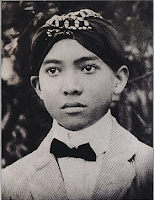Sukarno, born Kusno Sosrodihardjo (6 June 1901 – 21 June 1970) was the first President of Indonesia.
1947 but the older spelling Soekarno, based on Dutch orthography, is still frequently used, mainly because he signed his name in the old spelling. Official Indonesian presidential decrees from the period 1947–1968, however, printed his name using the 1947 spelling. The Soekarno–Hatta International Airport which serves near Jakarta, the capital of Indonesia for example, still uses the older spelling.
Indonesians also remember him as Bung Karno or Pak Karno. Like many Javanese people, he had only one name; in religious contexts, he was occasionally referred to as "Achmed Sukarno".The name Soekarno means "Good Karna" in Javanese.
The son of a Javanese primary school teacher, an aristocrat named Raden Soekemi Sosrodihardjo and his Balinese wife named Ida Ayu Nyoman Rai from Buleleng regency, Sukarno was born as Kusno Sosrodihardjo in Blitar, East Java in the Dutch East Indies (now Indonesia). Following Javanese custom, he was renamed after surviving a childhood illness. After graduating from a native primary school in 1912, he was sent to Europeesche Lagere School (Dutch-medium junior secondary school) in Mojokerto. When his father sent him to Surabaya in 1916 to attend a Hogere Burger School (Dutch-medium secondary school), he met Tjokroaminoto, a nationalist and founder of Sarekat Islam, the owner of the boarding house where he lived. In 1920, Sukarno married Tjokroaminoto's daughter Siti Oetari. In 1921 he began to study at the Technische Hogeschool (Technical Institute) in Bandung. He studied civil engineering and focused on architecture. In Bandung, Sukarno became romantically involved with Inggit Garnasih, the wife of Sanoesi, the boarding house owner where he lived as student. Inggit was 13 years older than Sukarno. On March 1923, Sukarno divorced Siti Oetari to marry Inggit (who also divorced her husband Sanoesi). And later on Soekarno also divorce Inggit and marry Fatmawati.
Sukarno graduated with a degree in engineering on 25 May 1926. On July 1926, with his university friend Anwari, he established the architect bureau Soekarno & Anwari in Bandung, which provided planning and contractor services. Among Sukarno's architectural works are the renovated building of the Preanger Hotel (1929), where he acted as assistant to famous Dutch architect Charles Prosper Wolff Schoemaker. Sukarno also designed many private houses on today's Jalan Gatot Subroto, Jalan Palasari, and Jalan Dewi Sartika in Bandung. Later on, as president, Sukarno remained engaged in architecture, designing the Proclamation Monument and adjecent Gedung Pola in Jakarta, the Youth Monument (Tugu Muda) in Semarang, the Alun-alun Monument in Malang, the Heroes' Monument in Surabaya, and also the designing of the new city of Palangkaraya in Central Kalimantan.
Atypically, even among the colony's small educated elite, Sukarno was fluent in several languages. In addition to the Javanese language of his childhood, he was a master of Sundanese, Balinese and of Indonesian, and especially strong in Dutch. He was also quite comfortable in German, English, French, Arabic, and Japanese, all of which were taught at his HBS. He was helped by his photographic memory and precocious mind. In his studies, Sukarno was "intensely modern," both in architecture and in politics. He despised both the traditional Javanese feudalism, which he considered as "backward" and was to blame for the fall of the country under Dutch colonialism, and the imperialism practiced by Western countries, which he termed as exploitation of humans by other humans and is responsible for the deep poverty and low levels of education of Indonesian people under the Dutch. To promote nationalistic pride amongst Indonesian people, Sukarno interpreted these ideas in his dress, in his urban planning for the capital (eventually Jakarta), and in his socialist politics, though he did not extend his taste for modern art to pop music; he had Koes Plus imprisoned for their allegedly decadent lyrics despite his reputation for womanising. For Sukarno, modernity was blind to race, neat and Western in style, and anti-imperialist.









0 comments:
Post a Comment